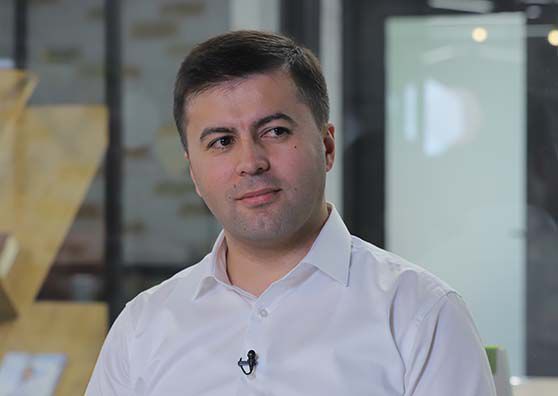“We want to make sure every patient in Uzbekistan who needs dialysis gets it free of charge”
Interview with Abdulla Azizov, Deputy Health Minister, Uzbekistan
Public-private partnerships, or PPPs, are often considered by governments looking to improve health care delivery. Abdulla Azizov, Uzbekistan’s deputy health minister, has experience with this. He spoke with IFC about his country’s first ever public-private partnership in health care, focused on expanding access to dialysis services. The COVID pandemic did not make the tendering process easy, but the government persevered and, assisted by IFC, ended up contracting with NephroPlus in a deal announced in December 2020. In this interview, Abdulla talks about why the government chose this route and the expected impact on health care services.
Why did your government choose dialysis for its first ever healthcare public-private partnership?
The quality of dialysis services in Uzbekistan was not satisfactory. The equipment was not in very good condition, patients had long waiting times, and there was a lack of capacity. By law, once a need is diagnosed, dialysis should be available to all patients in Uzbekistan for free. So the government wanted to build capacity and extend services to regions that were underserved. There was another consideration too. As this was our first health care PPP, we needed to have a ‘proof of concept’. At an investment cost of $10 million, it was safer to start with a smaller project instead of other potential PPPs like oncology which, while critical, would require an investment of more than $100 million.
What was the biggest challenge you encountered in putting the tender together?
Actually, it has been COVID. Some of the tendering processes had to be paused— announcements, validations— but we managed to get through it eventually. Because of the delays, investors at a certain point were reacting cautiously, wondering if this was the right move for them in a crisis or whether they should be focusing more on reducing their costs. And because this was Uzbekistan’s first international PPP we had to create a legal framework to manage it.
PPPs are complicated. How did you manage it so successfully?
IFC and the World Bank supported the Uzbek health ministry in developing dialysis service standards and a new patient referral process, and IFC reviewed the government’s due diligence standards. IFC also advised us on how to adapt our legal framework in a way that allows you to encourage investors but also protects your own national interest. Another benefit of working with IFC was it helped us attract well-known investors because investors are always looking for the involvement of an agency they can trust and IFC has a strong reputation for quality PPP projects in many countries.
If we had organized it on our own, maybe we would not have had so many well-known participants—11 in total, all international, and a good financial offer. And all the knowledge and experience we gained in this process will help us in the future.
What were the main attractions of the winning bidder, NephroPlus?
NephroPlus came up with a fantastic bid and a price that was a lot lower than other bidders. Also, the size of NephroPlus was a factor, being the eighth largest dialysis provider in the world, serving over 17,000 patients including in India, Nepal, the Philippines, and Vietnam. In Uzbekistan, they will be providing dialysis to a fixed number of patients—1,100—for ten years. It is a win for them too because they wanted to enter the Central Asian market. Now they have, and this will be noted in our neighboring countries.
Looking to implementation, how will you define success?
Firstly, based on improvement in the quality of service. Secondly, by increased availability or capacity. We want to make sure every patient in Uzbekistan who needs dialysis gets it free of charge. We also hope to build local expertise and knowledge among our doctors and other health care workers who will be trained by a major international partner. We believe that this PPP will enhance the image of the Uzbek health ministry to international investors and that they will consider Uzbekistan as a potential investment market.
In what areas of your health care system is private sector support or investment most needed?
Oncology and onco-hematology. The number of oncology patients is increasing globally for every type of cancer, the same is happening in Uzbekistan. We have a PPP project operating in radiotherapy with IFC and another for a new multidisciplinary hospital. Globally, there is a trend toward more multidisciplinary hospitals with 300-400 beds that cover different areas: emergency, traumatology, oncology. The Uzbek government is pleased with our first health PPP project: we got a good price; investors are coming to build and equip hospitals; and we are gaining knowledge and experience from an international partner on treatment protocols and business process. For us, this is crucial. When we do other projects, we will expect a similar outcome.
This interview has been edited for length and clarity.
Published in September 2021
Abdulla Abdisalamovich Azizov was appointed deputy health minister of Uzbekistan in 2020. Prior to his appointment, he served as Deputy Chairman of the State Tax Committee. From 2006–2019 he worked in Denmark for various companies, including Carlsberg, Danfoss, DONG Energy, Maersk, and Vestas. He is a graduate of Nagoya University of Japan (Bachelor’s in economy and Japanese culture), the University of World Economy and Diplomacy in Uzbekistan (Bachelor’s in international economic relations), and Aarhus University (Master’s in finance and international business) and Aarhus Technical College (Certificate in IT programming) in Denmark.
The Nephroplus project plans to have the first clinic open soon. IFC continues supporting the government through the post-transaction advisory support, which includes capacity building, support in the PPP contract monitoring, and assistance with potential issues or concerns to ensure successful implementation of the first-ever PPP and to build the contract management potential within the Ministry of Health.
- To stay up to speed with trends in emerging market healthcare, follow the IFC Health LinkedIn
-
